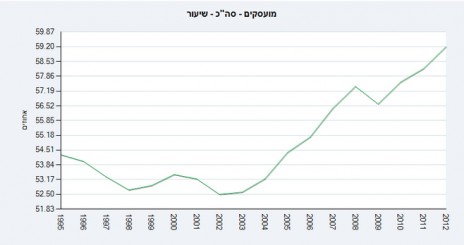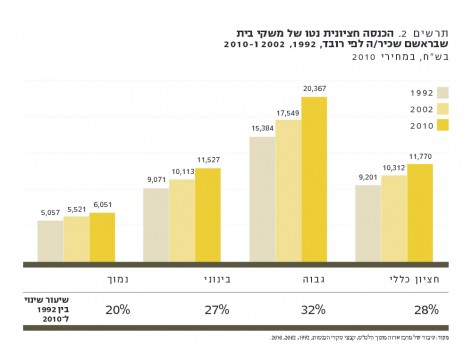So said Yair Lapid, the Israeli minister of finance, during a meeting of the ministerial committee for cost of living issues: In the last decade (2002-2012), growth was more than 24%, while real wages grew less than 2%. What does it mean? It means that during the last decade, every day someone was turning a buck at the expense of the middle class. Monopolies grew richer, lack of competition enriched the “tycoons”, giant corporations fattened up, powerful unions took care of their own, and only those who actually created all this wealth did not gain at all.
Lapid reported this statement himself, so there is no concern that his words were misquoted or taken out of context. He later repeated this statement in an interview with Charlie Rose, and again in a conference in Sderot, where he doubled down, declaring that
“The number I go to bed with is that in the last 10 years, growth in Israel was 26.8%. During these 10 years the increase in real wages was only 2.1%. Put differently: The people who built the Israeli economy, and turned it into a success story – did not gain anything from it.”
This is a central point for Lapid, and he repeats it time and again. He claims that it guides his actions – he goes to bed with it, and wakes up with it still on his mind.
Well, don’t be too shocked – Lapid is wrong.
The two facts that Lapid is citing are correct: GDP per capita did grow by just over 24%, and the average real wage did increase by only 2%. However, these numbers certainly do not support Lapid’s claim that “those who actually created all this wealth did not gain at all”. Before turning to the key questions – where is the media storm? Where are the snarky cartoons? Where is the flood of “oh now you finally see” that is so often directed at Lapid’s voters? To put it most succinctly, when the Israeli minister of finance is wrong about a fact of major importance – not the name of Don Quixote’s horse, or some minor detail about a specific factory – why do the guns of criticism, usually so readily aimed at Lapid, cease their fire?
But, before addressing this issue, we must first explain what is wrong about Lapid’s statement. In a nutshell, the reason Lapid’s statement is wrong is that over the last decade the share of Israelis who work rose dramatically. This development was the result of the fact that more people are trying to find jobs, and that a larger share of them actually finds it. Here is a graph with the data:
Why does it matter? Imagine an economy with 200 people, but where only a 100 of them actually work, and where the wage is a 1,000 Shekels a year. Say also that in this economy there are no capital owners. In this economy, GDP per capita is 500 Shekels a year (as the wage of each worker is shared by two people). Now, say that in the following year, everyone in this economy works, and the wage remains as it was – 1,000 Shekels a year. The result of this change is a doubling of GDP per capita, while the average real wage did not budge. All of the increase in production went to the pockets of the workers who made it happen, but, according to Lapid’s method, in this economy “those who actually created all this wealth did not gain at all”. Moreover – if the new workers earned only 800 Shekels per year, as new workers tend to have lower wages, GDP per capita would have increased by 80% while the average real wage would have declined by 10%, even though, again, all of the fruits of the increased production went to the workers who made it happen. One can only guess what Lapid would have said in such a situation.
To be sure – Israel is not exactly this economy (mostly because there was an increase in GDP per worker, not only in GDP per capita). However, once the large increase in the ratio of workers to total population is taken into account, it turns out that of the 24% increase in GDP per capita, workers claimed over half of the gain. It is a smaller share than the share that workers gained in past growth spurts, but the claim that those who created the wealth did not gain at all is preposterous, even if one accepts the less than standard assumption that only workers created all the wealth (and machines, buildings, infrastructure, etc. played no role at all. Just imagine the “Marxism!” cries if MP Yechimovitch made a similar claim).
The fact is, as reported by the ADVA Center, that the median net income for a household headed by a worker – a number that takes into account at least to some extent the fact that more people are working (and that wages aren’t the only source of income) – increased by 14% between 2002 and 2010. Again – that is median, real, net income, 14% increase. The fact that during these years GDP per capita rose much faster is reason enough for concern, even without turning the 14% increase into “workers did not gain at all”. (Data for median incomes are reported with substantial lag, and no data could be found to update these numbers to match Lapid’s time frame. However, average net income rose by a few percent since 2010).
Now back to the key question: Why? How come that with a media that just can’t wait for Lapid’s next gaff, the minister of finance walks away unscathed when his main talking point, the number he goes to bed thinking about, is based on misunderstanding basic economic concepts? There are two potential answers to this question. Both are equally troubling.
The first one is ignorance by the media. Lapid’s claim makes sense, at least when hearing it for the first time, and unlike the name of a horse, no amount of googling can reveal what is wrong with it. Even hard working journalists, who scour mountains of documents on a daily basis to find, for example, that Lapid misstated the content of an agreement the Israeli government signed with the OECD, cannot find the document that will show what is wrong with Lapid’s calculation. To get it right, one needs a good grasp of the meaning of economic concepts and to be familiar with recent trends in the Israeli economy. It is all too possible that too many journalists just lack this knowledge, and so missed Lapid’s mistake.
The other option is that no one really cares about Lapid’s mistakes per se, or those of any other politician for that matter. The media only care about these mistakes when pointing them out serves their own political agenda. The problem, as they see it, is not that Lapid does not understand the world; the problem is that he doesn’t understand how right they are! When that is the motivation, mistakes are not judged by how important they are, but by how much they serve the agenda of the person pointing them out. The alleged stagnation of real wages is an agenda – indeed, the agenda – of many of the top journalists in Israel. And so, pointing out Lapid’s mistake does not seem to serve anyone’s political goal.
To be fair, just about anyone can make the same mistake that Lapid made. But Lapid is not just about anyone – he is the minister of finance. And the fact that he demonstrated such deep misunderstanding about some of the most important trends in the Israeli economy is important, and must be pointed out, even if it is not funny, and even if it doesn’t serve anyone’s political agenda. That it did not happen should frustrate anyone who hopes for a well-informed debate over the very real economic challenges Israel faces.
This Article was first published on The Seventh Eye. Read it in Hebrew here











